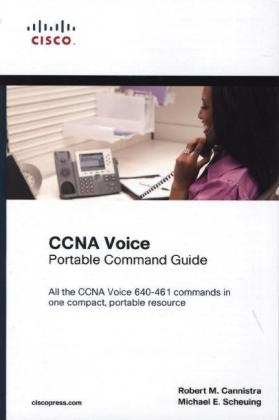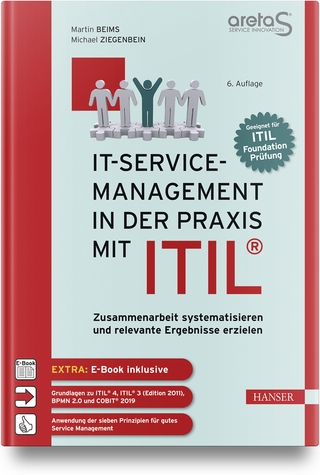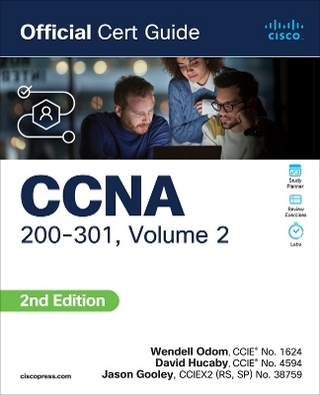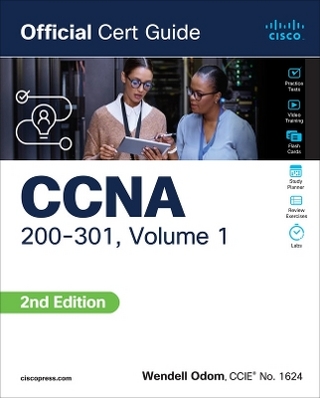
CCNA Voice Portable Command Guide
Cisco Press (Verlag)
978-1-58720-442-5 (ISBN)
- Titel ist leider vergriffen;
keine Neuauflage - Artikel merken
Topics covered include
• Fundamentals: Unified Communications components, functions, call signaling, media flows, and VoIP quality
• Preparation: Configure Cisco switches, routers, and other devices to support Unified Voice
• Provisioning: Create/modify users, accounts, endpoints, directory numbers, user and mobility features, and calling privileges
• Messaging and Presence: Configure voice messaging, Cisco Unity Connection, and Cisco Unified Presence
• Management/Monitoring: Generate reports, monitor voicemail usage, perform backups, and more
• Support: Verify PSTN connectivity and define fault domains; troubleshoot endpoints, call quality, and voicemail
Access all CCNA Voice commands–use as a quick, offline resource for research and solutions
Logical how-to topic groupings provide one-stop research
Great for review before CCNA Voice 640-461 certification exams
Includes configuration examples for Cisco Unified Communications Manager, Cisco Unified Communications Manager Express, Cisco Unity Connection, and Cisco Unified Presence
Compact size makes it easy to carry with you, wherever you go
“Create Your Own Journal” section with blank, lined pages allows you to personalize the book for your needs
“What Do You Want to Do?” chart inside cover helps you quickly reference specific tasks
This book is part of the Cisco Press® Certification Self-Study Product Family, which offers readers a self-paced study routine for Cisco® certification exams. Titles in the Cisco Press Certification Self-Study Product Family are part of a recommended learning program from Cisco that includes simulation and hands-on training from authorized Cisco Learning Partners and self-study products from Cisco Press.
Robert M. Cannistra is a full-time faculty member at Marist College located in Poughkeepsie, NY, where he teaches networking, voice communication, security, wireless communication, and system administration courses within the School of Computer Science and Mathematics. Outside of teaching, Robert provides network consulting services for enterprise, service provider, and medical organizations for network design, configuration, and troubleshooting. Robert has held the positions of Northeast Regional Manager, Technical Services Manager, and Senior Consultant for a Cisco Gold Partner. His time there was spent designing, configuring, and implementing highly accessible data networks for various enterprise, service provider, and Internet companies across the world; some of those clients included Quaker Oats, Milwaukee Electric Tool, AC Nielsen, Cogent Communications, and EthnicGrocer.com, among numerous others. Upon the completion of each client implementation, he would develop and instruct customized training courses to help the client manage the newly designed networks. Robert has taught as an adjunct faculty member at Rensselaer Polytechnic Institute (RPI) for their Computer Science, Engineering, and Information Technology curricula and as an adjunct technical instructor for a technical institute in Poughkeepsie, NY. He has also held the positions of Senior Network Engineer for About.com, Inc., Internet and Intranet Infrastructure Webmaster at AT&T Solutions, and Systems Engineer at Kodak Imaging Services. Robert holds a master of science degree in Computer Science/Information Systems, a bachelor of science degree in Computer Science, an associate of science in Liberal Arts and Science, and several industry technical certifications including CCAI, CCNA, CCSP, MCSE, CLP, and several others. Whenever Robert has a free moment (which isn’t very often), he enjoys spending time with his wife, Kara, two sons, Luca and Rylan, and their dog, Tripster (a coonhound who always stands right behind him and his wife so they take full advantage of her name...as they trip over her). Michael Scheuing has witnessed the evolution of Cisco voice products since first working on Call Manager 3.1 many years ago. Drawing upon 15 years of telephony and network experience, Michael has designed, implemented, and maintained voice and data infrastructures for small businesses and large enterprise alike. Michael currently works as a Telecommunications Engineer responsible for the architecture and management of a complex voice and video network consisting of legacy PBXs, Cisco Unified Communications Manager, and Cisco TelePresence.
CHAPTER 1 Voice Fundamentals for Unified Communication 1
Voice Fundamentals 1
Cisco VoIP Structure 3
Common Topologies 3
CHAPTER 2 Cisco Switch, Router, and Phone Fundamentals for Unified Voice 7 Technology Overview—Device Connections: Router, Switch, IP Phones 7
Topology 8
Configuration 9
Configure the Router’s Hostname 9
Configure the Router for InterVLAN Routing 9
Configure the PoE Switch for Basic Connectivity 10
Configure Voice and Data VLANs on the PoE Switch 11
Configure One Interface for the Data VLAN 11
Configure One Interface for the Voice VLAN 11
Configure One Interface for Both the Data VLAN and the Voice VLAN 12
Reset the Cisco 7965G Unified IP Phone to Factory Defaults 13
Verification 13
Troubleshooting 14
Actively Debug Issues When They Arise 14
CHAPTER 3 Cisco Unified Communications Manager Express 15
Topology 15
Administration Interfaces 16
Configuration 16
Configuring Cisco Unified Communications Manager Express for the First Time 16
Accessing and Using the Cisco Configuration Professional 16
Basic Telephony Settings 23
CHAPTER 4 Cisco Unified CME Features 49 Creating Extensions 49
Modifying Extensions 63
Deleting Extensions 65
Cloning Extensions 66
Creating Phones and Users 67
Modifying Phones and Users 82
Deleting Phones and Users 83
Other Telephony Features 85
CHAPTER 5 Cisco Unifi ed Communications Manager (CUCM) Administration and Management 87
Topology 88
Cisco Unified Communications Manager Administration Interfaces 88
Accessing the Management GUI and CLI Interfaces 89
Accessing and Using the Web GUI 89
Accessing and Using the CLI 91
Changing CUCM Name to IP Address for DNS Independence 93
Configuring a Unified CM Group 97
Configuring a Phone NTP Reference 99
Configuring a Date/Time Group 99
Configuring a Region 101
Configuring Locations 104
Configuring Device Pools 105
Configuring a Partition 106
Configuring a Calling Search Space 108
Activating Services and Features 109
Creating a Phone Button Template 111
Creating a Softkey Template 112
Creating a Common Phone Profile 114
Creating an Application User with Administrative Rights 116
Creating an Application User with Read-Only Rights 118
Creating an End User Manually 118
Adding Users via LDAP Synchronization 119
Configuring LDAP Authentication for End Users 122
Adding an IP Phone to CUCM Manually 123
Adding a Directory Number (DN) to a Phone 125
Adding Phones Using Auto-registration 128
Adding End Users and Phones with the Bulk Administration Tool (BAT) 130
Configuring an H.323 Gateway in CUCM 134
Configuring a Route Pattern 135
CHAPTER 6 Cisco Unified Communications Manager (CUCM) Telephony and Mobility Features 139 Topology 140
Configuring a Hunt Group 140
Configuring a Line Group 140
Configuring a Hunt List 143
Configuring a Hunt Pilot 144
Configuring Shared Lines 145
Configuring Barge and Privacy 147
Configuring Call Forward 149
Configuring Call Pickup 152
Configuring Call Park 154
Configuring Directed Call Park 155
Configuring Native Presence (Busy Lamp Field [BLF] Speed Dial) 156
Configuring Extension Mobility 159
Configuring Intercom 164
Configuring Mobile Connect 167
Configuring Mobile Voice Access (MVA) 172
Summary 175
CHAPTER 7 Cisco Unity Connection and Cisco Unifi ed Presence 177
Topology 178
Cisco Unity Connection Administration Interfaces 178
Cisco Unity Connection 178
Configuring Class of Service in Cisco Unity Connection 180
Configuring Partitions and Search Spaces in Unity Connection 182
Configuring User Templates in Cisco Unity Connection 184
Managing Users in Cisco Unity Connection 185
Adding Users Manually 185
Importing Users via AXL from CUCM 186
Importing Users with LDAP 189
Importing Users with the Bulk Administration Tool (BAT) 191
Configuring Call Handlers in Cisco Unity Connection 195
Cisco Unity Connection Reports 200
Cisco Unified Presence Server Administration Interfaces 201
Cisco Unity Connection and Cisco Unified Presence Backup and Restore 201
CHAPTER 8 Management, Monitoring, and Troubleshooting CUCM 203 Topology 203
Cisco IP Phone Boot and Restart Processes 204
Cisco IP Phone Boot Process 204
Phone Restart Procedure 205
Troubleshooting Using the Phone Web Page 205
Dialed Number Analyzer 207
Cisco Unified Reporting 210
Cisco Real Time Monitoring Tool (RTMT) 211
Monitoring and Troubleshooting Using CLI Commands 216
Configuring Backup and Recovery 217
Summary 218
CHAPTER 9 Putting It All Together 219
Topology 219
Design 220
Configuration 220
Verification 223
Troubleshooting 223
APPENDIX Create Your Own Journal Here 225
| Erscheint lt. Verlag | 21.2.2013 |
|---|---|
| Verlagsort | Indianapolis |
| Sprache | englisch |
| Maße | 157 x 228 mm |
| Gewicht | 350 g |
| Themenwelt | Mathematik / Informatik ► Informatik ► Netzwerke |
| Informatik ► Weitere Themen ► Zertifizierung | |
| ISBN-10 | 1-58720-442-8 / 1587204428 |
| ISBN-13 | 978-1-58720-442-5 / 9781587204425 |
| Zustand | Neuware |
| Haben Sie eine Frage zum Produkt? |
aus dem Bereich


